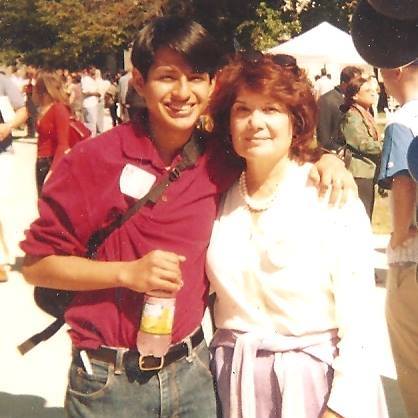Pictured, a younger Jonathan with his adoptive mother.
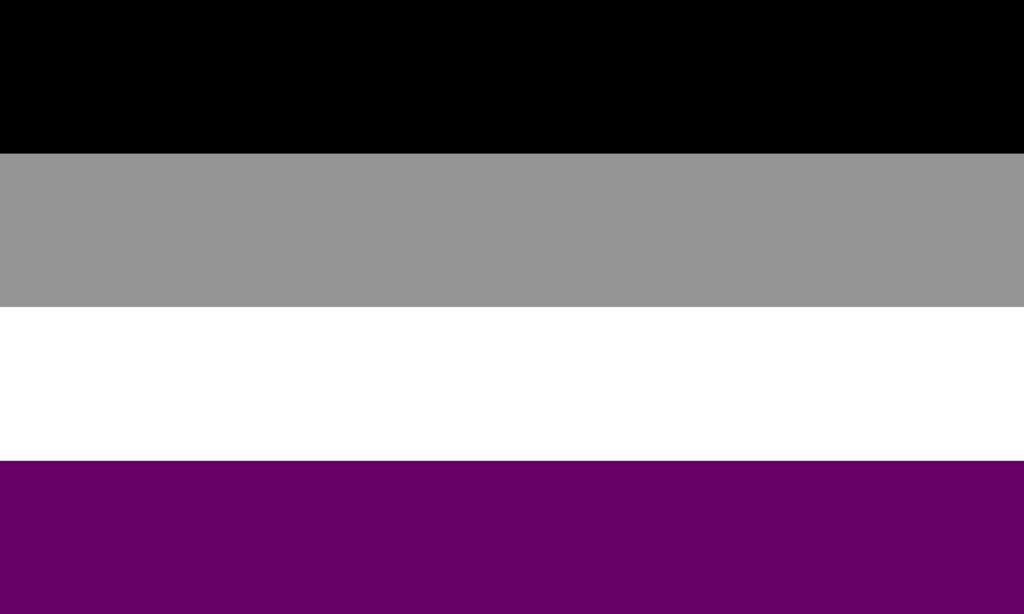
Issue 8’s Featured Writer and winner of Alphabet Box’s Anaïs Nin & Henry Miller Prize is Jonathan Fletcher. After reading his five-poem submission, I had to return to them again and again, a rarity in my years of reading, editing and judging writing. In addition to reading his poetry featured here, I found him to be unflinching and transparent in his writing and this interview. He may *seem* egotistical, but he’s not. He was also willing to patiently and politely answer my probably run-of-the-mill (and sometimes silly) questions. To his credit, he’s no longer shy about intimately revealing himself and what motivates him to write poetry.
I didn’t know him or his writing, until he submitted to Alphabet Box. I didn’t know he was born in South America and now resides in the United States. I didn’t know he was adopted. And, I didn’t know of his journey to gender-identity, until he answered my final questions… by asking one.
Now that I know him better and have read his new chapbook — This Is My Body — one thing seems certain. There’s no question about a successful and poetic present and future for Jonathan Fletcher that needs to be answered. — Stephen FitzGerald, Alphabet Box editor.
Growing up
Your earliest memory?
At a little under a year, I moved with my adoptive mother to Memphis, Tennessee. Though I did spend a couple years there, I remember hardly anything about that period in my life.
I remember the cathedral ceiling in our first house in San Antonio. I’ve never lived somewhere with as high a ceiling, and I do miss the way you could look up and feel as if you were gazing at the heavens.
Your primary school life? Good student or not? Sociable or not?
Though I was noticeably shy in primary school, I did make friends mostly easily. In terms of academics, I struggled during my earliest years. In fact, I was held back in first grade.
What did you want to be when you grew up?
I wanted to be a screenwriter. In fact, I remember this being included in my yearbook profile.
Describe your teen years and interests.
During my adolescence, I ran cross-country and track and participated in a number of clubs, such as National Honor Society and Spanish Honor Society.
Your favorite type of reading or entertainment outside of school?
Usually, I hung out with friends and watched films. With regard to reading, I read mostly novels, sometimes, comic books or graphic novels. Though I did read on a regular basis as a youth, I didn’t read as avidly as now.
What was your first paying job?
A junior camp counselor at the academy I attended and from which I would eventually graduate.
Why did you decide to go to college and where did you attend?
For me, college really wasn’t optional. My adoptive mother holds a Ph.D. in special education. She expected me to go. Not that she needed to push; I wanted to attend college. Though I did not finish there — instead graduating from a local liberal arts university — I started at the University of Chicago.
How did your college classmates or roommate(s) describe you socially and/or academically?
I hate to think how my former classmates and roommates described me academically. Not that I was a partier, but I struggled severely in that context.
I do think they liked me. After I left the school, my mother shared with me that one of my classmates told her that the room always lit up when I walked into it. Though I haven’t talked to him in years, I hope he forgives me for being a less-than-ideal roommate and friend.
On writing
At what age did you take a serious interest in writing?
Probably, I only took a serious interest in writing at the age of 14, when I matriculated at North East School of the Arts (NESA), a magnet high school in San Antonio.
Did you begin with writing poetry or did it come later?
Though I did dabble in other forms, I focused on poetry. Though we didn’t have to declare a concentration in order to apply to the program, we did have to choose a form in which to mostly work and from which we would develop a thesis project.
Do you remember the first poem you wrote?
Yes, it was entitled, “The Underground Railroad.” In my third-grade class, we had recently studied a unit about it. I certainly wouldn’t write a piece like that now — as the piece, my  attempt to write from the perspective of a runaway slave, would read problematic today. It was an exercise in empathy, and I do appreciate that about the poem, even if I grimace at other aspects of it.
attempt to write from the perspective of a runaway slave, would read problematic today. It was an exercise in empathy, and I do appreciate that about the poem, even if I grimace at other aspects of it.
Although I didn’t share the piece with others, it got published, unbeknownst to me. My teacher was so impressed by the poem that she submitted it to a children’s literary magazine that accepted it for publication. How many people can say that they had work published in third grade? Some, I’m sure, but not many. I’m one of them.
Do you have a writing routine? Time, place or other circumstances?
Though I should have a more established writing routine, I don’t. Whenever I get an idea for a poem or a line strikes me, I try to stop what I’m doing and write down as much as I can. I try to write whenever I feel a poem forming and rising in me.
Have you taken breaks from writing? What was the longest?
My longest break from creative writing was probably during my first years at college. Though I hadn’t completely given up on writing, I was struggling academically, so everything was focused on how to break through my severe writer’s block in order to complete my overdue assignments, pass the many classes for which I received “incompletes,” and not be asked to leave the school.
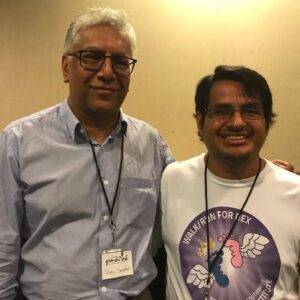
As a writer, the best advice you’ve ever received?
The best advice on writing I’ve ever received was more of a caution. As I prepared to depart for New Your City, where I was to study creative writing on the graduate level, a friend of mine who had recently completed an MFA in Creative Writing told me that whatever else happened, I should not let the program change my voice.
Though I immensely enjoyed my time at Columbia, I know that not everyone in my program had a good experience. Yes, one should learn and take in all the feedback they get… but not necessarily apply it. However, no one should ever make you change your voice as a writer.
Grow, yes, but don’t lose your voice. If I could only give one bit of advice to aspiring writers, that would be it.
You’re on Bluesky, Facebook and X. Which do you think is better for interacting with other writers?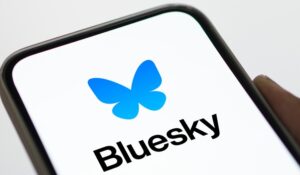
Personally, I like Bluesky; I find the community there more inviting and warm. Though I’m still on X, a lot of my writer friends have defected. At some point, I’m sure I’ll follow suit.
On your new book
Your first poetry chapbook came out a few weeks ago, titled This Is My Body. Why did you choose this title?
When compiling the manuscript, I was struck by some of the religious themes throughout the collection, and though I’m not particularly religious, I was raised Catholic and still consider myself one culturally. All that to say, I think the title — This is My Body — an allusion to the phrase recited during the Eucharist. It refers to the consecrated bread, a symbol of the body of Christ, and encapsulates the idea of a sacred embodiment, whether affirming or painful, whether religious or secular.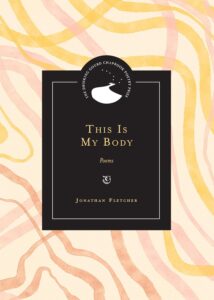
It’s a very intimate collection of poems. Was this intentional from the start? When you decided to write it, were you writing for an audience of one, you, or beyond
From the start, that was intentional. Primarily, I was writing it for my adoptive mother. The chapbook being largely confessional in content, there were things I felt were best said, or at least communicated, to her through poetry.
I ultimately broadened the manuscript thematically to appeal to a general audience, but I had my mother in mind from the beginning.
You dedicate or introduce the book as being “for my mother.” After reading Mummy, may I ask which mother? And why?
I had intended the dedication primarily for my adoptive mother, but as you correctly pointed out, I do allude to my biological mother, and I do think that subconsciously, I did have the latter in mind when deciding upon the dedication.
In the case of my biological mother, I am grateful to her for giving me the chance at a better life, and in the case of my adoptive mother, I am grateful for her making that opportunity a reality.
In a few days, on March 13th, you’re the evening’s featured author at The Twig Book Shop in San Antonio, Texas. Is this your first such event? Yes or no, how are you feeling in advance of it?
My reading at The Twig is not actually my first author event. My first one was with the current Poet Laureate of San Antonio, held at the San Antonio Public Library last month.
Though I am excited, I’m also kind of nervous. I’m thinking about which poems I would like to read, as I’m trying to read a different set of pieces for every reading.
Alphabet Box poems
Three of your five Featured Writer poems are clearly extrospective, in contrast to the other two and the poems in This Is My Body. Do you see more similarities than I do?
Although I don’t see more similarities than you’ve identified, I did want to mention that I’m currently working on a chapbook-length manuscript in which I’m trying to witness to contemporary issues of social justice, as opposed to writing from the interior. I’m not sure how it’s going to turn out, but I’m excited to work with a different approach.
Getting personal
What toppings are on your pizza?
Mushrooms, definitely, and probably nothing else. What can I say? I’m a man of simple tastes.![]()
![]()
Your favorite meal and why?
Pasta. Partly, I think, because I was raised by an Italian-American mother who cooked a lot of dishes from the Old Country, but also because I just like the texture and flavor. In terms of cuisine, as most other things, I really lucked out in the adoption.
Do you have a hobby or passion, besides writing and reading?
For the past several months, I’ve been skating at the local roller rink and try to go at least once a week. I am admittedly one of the older skaters. I really do enjoy it. Besides, it’s good physical activity, and as someone who only runs on occasion these days, I need it.
Who are you reading for pleasure?
I am reading Erich Maria Remarque’s famous anti-war novel, All Quiet on the Western Front. My students chose that for the book club which I facilitate. I’m glad we’re reading it, as I’ve wanted to delve into that novel for a while.
If you could live anywhere else or have a second home, where?
New York. Though I do love my hometown of San Antonio — it’s why I moved back — I’ve never lived in a more exciting city than New York. Admittedly overwhelming at times, it’s such a neat place to live. Name almost anything, and you can probably find it there.
What three living or deceased non-writers inspire you the most?
My adoptive mother, Bertrand Russell and one of my former professors, who is a queer theologian, Dr. Jane Grovijahn.
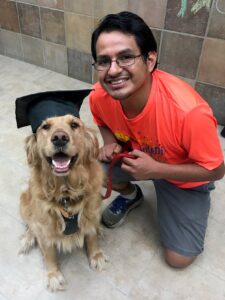
Have you ever taken the Myers-Briggs personality test?
As strange as it might sound, I’ve never taken it. Now, I think I will.
My final questions… If you were interviewing yourself, what personal question would you ask? And your answer?
Are you dating anyone at the moment? No, I’m not, but I would eventually like to settle down with someone. I’m asexual or an ace, not an aro. While open to dating an allosexual, I’d prefer to date another ace, as I’ve heard too many horror stories about aces getting manipulated by allos; no shade to the latter as a whole, though!
That’s our interview. Thank you for your poetry and time, Jonathan.
Jonathan Fletcher holds a Master of Fine Arts in Creative Writing from Columbia University School of the Arts. His work has been featured in numerous journals and magazines, and he has won or placed in various literary contests. A Pushcart Prize, Best of the Net, and Best Microfiction nominee, he won Northwestern University Press’s Drinking Gourd Chapbook Poetry Prize contest in 2023, for which his debut chapbook, This is My Body was published in 2025. He serves as a Zoeglossia Fellow and resides in San Antonio, Texas.
Click to read his Anais Nin & Henry Miller Prize-winning poems on Alphabet Box. We also invite you to follow Jonathan’s posts on Bluesky @jmfletcher15.bsky.social and learn more about his educational and community engagement on his Facebook page.
